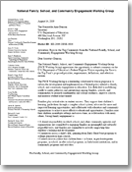The Harvard Family Research Project separated from the Harvard Graduate School of Education to become the Global Family Research Project as of January 1, 2017. It is no longer affiliated with Harvard University.

|
April 2011 Commentary from the National Family, School, and Community Engagement Working Group on the Promise Neighborhoods ProgramNational Family, School, and Community Engagement Working Group |
Article Information
- Full Text (HTML)
- Full Text (PDF: 99 kb)
Read Commentary from Harvard Family Research Project
Harvard Family Research Project also submitted recommendations for the Promise Neighborhoods program’s proposed priorities, requirements, definitions, and selection criteria.
Read now
About the Promise Neighborhoods Program
The Promise Neighborhoods Program brings together families, community organizations, educational programs, and schools to improve the educational outcomes of children living in impoverished neighborhoods. The program’s vision is that all children living in a Promise Neighborhood will grow up with access to a high-quality school and a network of family and community supports that will prepare them for college and a career. Planning grants were first awarded to 21 grantees in September 2010.
The U.S. Department of Education has announced the 2011 competition for funds to assist with the planning and implementation of Promise Neighborhoods strategies and invited the public to comment on the program’s proposed priorities, requirements, definitions, and selection criteria.
Read the official notice posted by the U.S. Department of Education on the Federal Register.
The National Family, School, and Community Engagement Working Group's Commentary
The National Family, School, and Community Engagement Working Group, a collaborative of leaders in the family engagement field, including Harvard Family Research Project’s Heather Weiss, commended the Department on the goals of the Promise Neighborhoods program.
The Working Group also encouraged the Department to adequately embed research-based, effective family engagement into the proposed criteria. The Working Group’s proposed recommendations include elevating families as strategic partners in the planning process and governance boards of Promise Neighborhoods; requiring student data to be made accessible, understandable, and actionable to families; and emphasizing family engagement in student learning in the adult education component of the program.
Additionally, the Working Group recommended enhancing the program’s proposed definitions of key elements (i.e., family engagement, education programs, and family and community supports) to more clearly stress the importance of partnering with families and the community to improve academic achievement. And, finally, the Working Group incorporated Harvard Family Research Project’s suggestions to strengthen the program’s proposed indicators and results by aligning family and community support indicators with educational results.
About The National Family, School, and Community Engagement Working Group
The National Family, School, and Community Engagement Working Group was created to inform educational policy on family engagement and in so doing, to improve educational opportunities for all children, from cradle to career. We present a broadened definition of family engagement and a platform to strengthen it in education reform efforts.
Free. Available online only.
